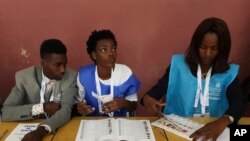Angola's ruling party took a strong lead in early election results released Thursday, the nation's electoral commission said, drawing immediate objections from opposition parties.
The national election commission reported late Thursday that the People's Movement for the Liberation of Angola had so far won just over 64 percent of the vote in Wednesday's poll. Commission spokeswoman Julia Ferreira spent about an hour reading out the results province by province. In every one of Angola's 18 provinces, she said, the MPLA was ahead, often by wide margins.
Until final results are in, however, the capital province of Luanda could still be in play, with several opposition strongholds yet to be counted and the ruling party holding on to a razor-thin 50 percent share of the vote.
Differing counts
The leading opposition party, the National Union for the Total Independence of Angola, or UNITA, said its independent vote count told a different story. The official results gave the party just over 24 percent.
"These results which were presented are different from the results we have," UNITA MP Estevao Jose Pedro Kachiungo told journalists after the preliminary results were announced.
But, he said, the party would remain calm until results were final.
The second-largest opposition party, Broad Convergence for the Salvation of Angola — Electoral Coalition, or CASA-CE, said Thursday on its Facebook page that "7/10 young people say they have voted for [party leader] Abel Chivukuvuku."
Early results gave CASA-CE just under 9 percent of the national vote.
Both opposition parties also alleged during the election campaign that the MPLA had used government resources for campaigning, and that the state broadcaster had given the party preferential treatment. The MPLA denied irregularities, and observers largely praised the poll for being peaceful and orderly.
Whatever the result, cracks have already begun to appear in the facade of the powerful MPLA, which has ruled Angola as a de facto one-party state since independence from Portugal in 1975. Since 1979, one man has led the party and the nation, President Jose Eduardo dos Santos. But he stepped down this year, choosing his foreign minister, Joao Lourenco, as his successor.
Support slips
The party has lost ground in the last two elections, winning just under 72 percent of the vote in 2012 and just under 82 percent in 2008. On the streets of Luanda, the ramshackle seaside capital, shiny but unfinished high-rises tower over crowded shacks with corrugated metal roofs. This glaring wealth gap — compounded by problems such as high unemployment and rampant inflation — has propelled many citizens to seek political change.
In Cazenga, an impoverished opposition stronghold in the capital, Esperanca Francisco Domingos, 42, said she decided to vote for the first time in her life because she was desperate to see her economic situation improve.
"I voted for change because everybody says that we have to vote for change," she said. " ... We haven't seen any change, and we are suffering."




